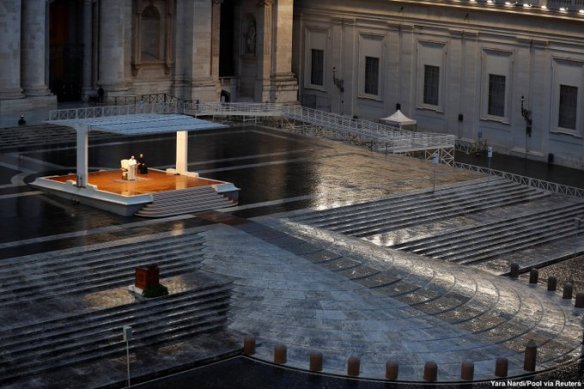
Last Friday night (March 27, 2020) Pope Francis I gave a special homily and blessing, “Urbi et Orbi” (City and World) addressing the pandemic crisis, and he did so with his typical flair for the symbolic, speaking from the midst of an eerily empty and rain-swept St. Peter’s Square.
The Pope bravely called out both the causes and the effects of the “Thick darkness” that has settled over all our public squares, our streets and our cities. In addition to the obvious travails of illness and death, Francis identifies the evil of these times to lie chiefly in the fact that almost every form of community we have known and taken for granted has been emptied out (like St. Peter’s square itself), so that nothing seems left to us but “a deafening silence and a distressing void.”
Francis takes as his opening text “When evening had come” (Mk 4:35), and places all of us firmly in the gloomy context of the story of Jesus and the apostles caught in a storm on the Sea of Galilee.Throughout the gloomy tale, Francis remains firm in his hope in Christ.
My comment: let’s remember too, that the Jewish day begins at sundown. There are good grounds to interpret this text to say “A new day had come.” The Bible itself begins with a creative run of “evenings and mornings,” each of which spins darkness into light, and ends up being called “good” in the divine sight.
It is eternally true: every apparent night-fall, every clouding of vision, every limit on mobility, can be an open door. The difficulty is that we cannot see the door unless we look straight at the problem. To see the door aright is the same as taking the hint that our own errors did not begin with the confusion. Some of them have led us here. And we have to accept the call to leave our comfort zone behind in the way forward. Continue reading
